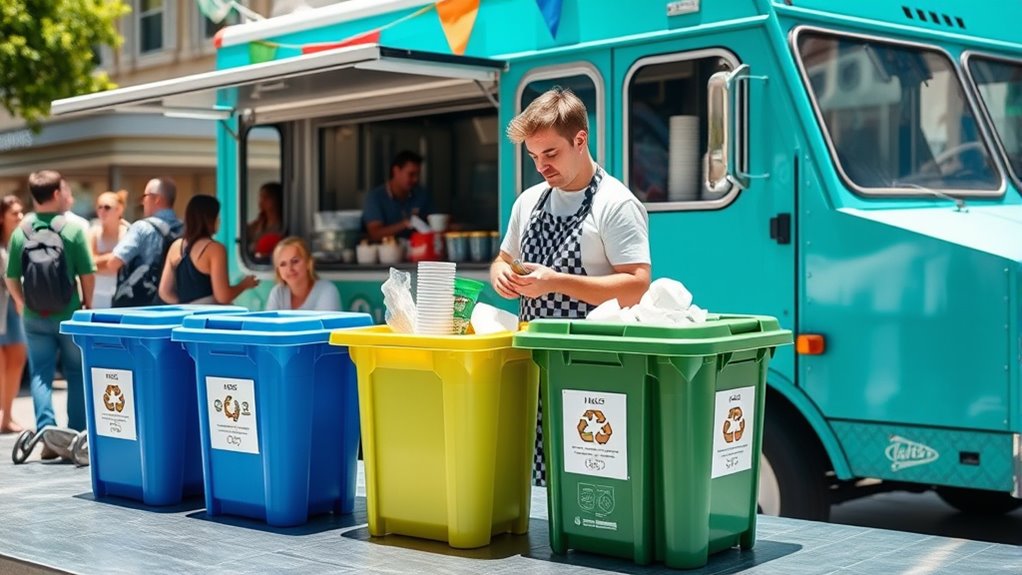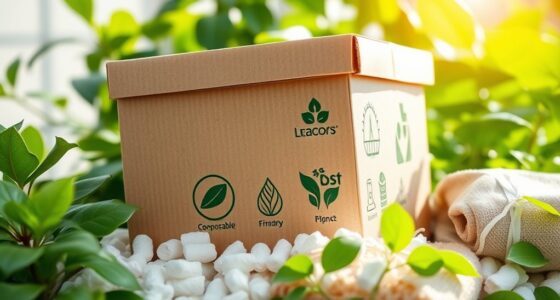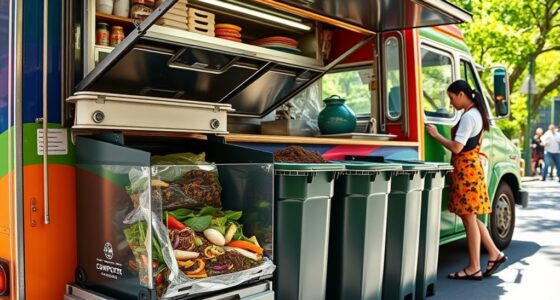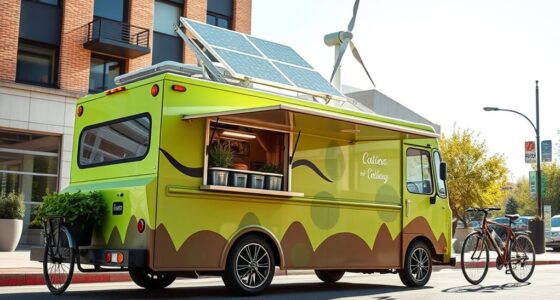To implement recycling programs at your food truck, assess your space to choose the right containers that are accessible and clearly labeled. Train your staff regularly on proper waste separation and recycling procedures to guarantee consistency. Establish partnerships with local recycling facilities and create clear collection schedules. Promote eco-friendly practices to your customers using signage and incentives. If you keep exploring, you’ll discover effective strategies to make your recycling efforts more seamless and impactful.
Key Takeaways
- Conduct waste audits to identify common waste types and establish clear categories like recyclables, compostables, and trash.
- Position labeled, accessible bins near prep stations and customer areas to promote proper waste separation.
- Train staff regularly on waste handling, sorting procedures, and the importance of recycling to ensure compliance.
- Use eco-friendly, durable containers and signage to encourage environmentally responsible disposal practices.
- Engage customers with signage, social media, and incentives to promote sustainable choices and composting participation.
Assessing Space and Storage Needs
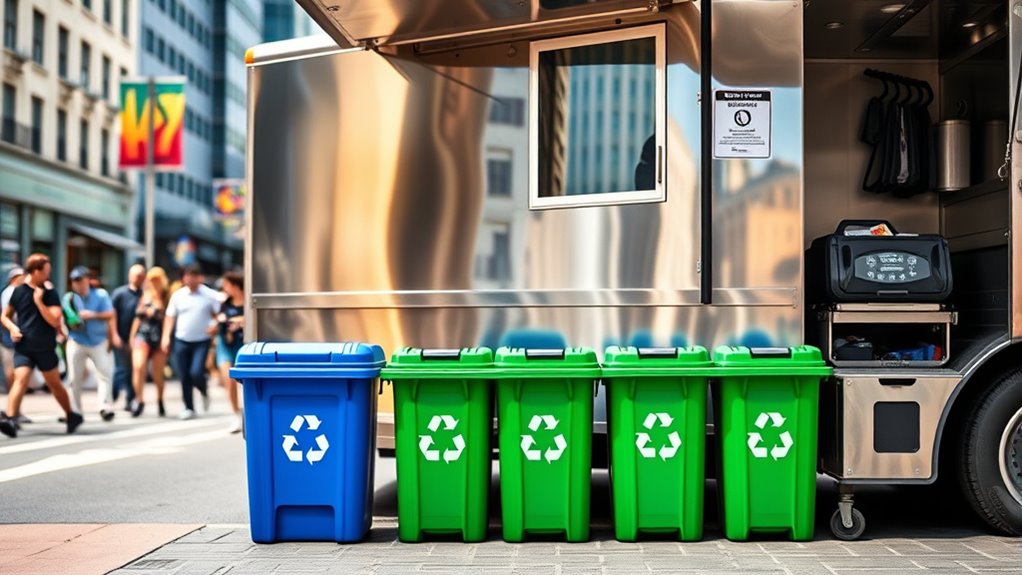
Before implementing recycling programs at your food truck, it is vital to evaluate your space and storage options. Start by considering bin placement; guarantee bins are accessible yet out of the way to prevent congestion. You’ll need to assess your available space to determine the right container capacity, avoiding bins that are too small, which require frequent emptying, or too large, which waste space. Think about workflow when placing bins—near prep stations and trash areas makes recycling more convenient. Measure your available surfaces carefully and decide how many containers you can accommodate without cluttering. Clear, strategic bin placement and appropriate container capacity ensure your recycling system is efficient, easy to maintain, and integrated smoothly into your truck’s limited space. Additionally, understanding the effectiveness of recycling can help you choose suitable materials and practices for your setup. Incorporating proper sorting techniques can further enhance the efficiency of your recycling efforts. Being mindful of community engagement can also encourage customers to participate actively in your recycling initiatives. Moreover, fostering a culture of creative practice among staff can lead to more innovative solutions for space and waste management challenges.
Selecting Suitable Recycling Containers
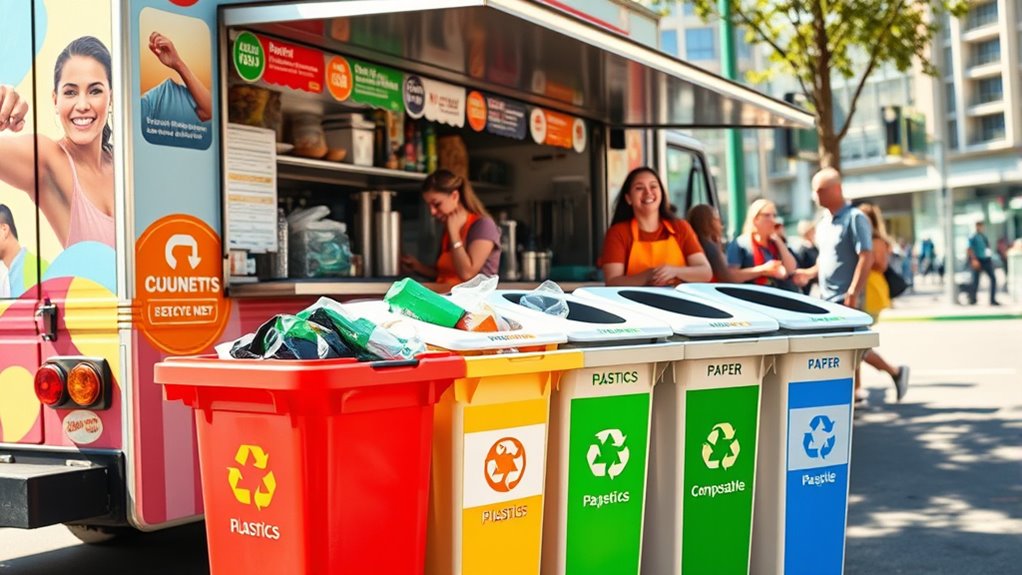
Choosing the right recycling containers is essential for encouraging proper waste disposal on your food truck. Consider container materials that are durable and easy to clean, and place them where customers can easily see and access them. Proper placement and visibility will help increase recycling rates and keep your truck tidy. Additionally, clearly labeling containers with appropriate signage can guide customers in proper disposal practices. Incorporating recycling education into your signage can further motivate customers to participate actively. Understanding the types of recyclable materials commonly generated by food trucks can help you select the most effective containers and labels. Using sustainable practices can also demonstrate your commitment to environmental responsibility and encourage community participation. Leveraging vibrational energy by maintaining a positive environment around your recycling efforts can also encourage more participation from customers.
Container Materials Choices
Selecting the right materials for recycling containers is essential to guarantee they are durable, eco-friendly, and suitable for the food truck environment. You want containers that withstand daily use and align with your sustainability goals. Consider biodegradable packaging options that break down naturally, reducing environmental impact. Reusable containers are also a smart choice, allowing you to cut waste and promote eco-conscious practices. When choosing materials, focus on durability, ease of cleaning, and compatibility with your recycling system. Keep in mind that lightweight options ease transportation and handling. Incorporating material science innovations can further enhance the performance and eco-friendliness of your containers. Additionally, understanding ethical practices in material sourcing can help ensure your containers are produced responsibly. Ultimately, selecting the right container materials helps reinforce your commitment to sustainability and ensures your recycling program runs smoothly.
Placement and Visibility
Placing recycling containers in easily accessible, visible locations is essential to encourage proper waste separation and guarantee your program’s success. Use creative signage to clearly indicate what each bin is for, reducing confusion. Digital signage can be an effective tool, grabbing attention and providing real-time reminders about recycling. Position containers near high-traffic areas, such as order pickup spots or waste disposal zones, so customers see them naturally. Avoid hiding bins in corners or behind equipment, as this decreases participation. Make sure the containers are at a comfortable height and clearly labeled. Combining creative signage with digital displays helps reinforce your message and makes recycling an effortless part of the customer experience, increasing the likelihood of consistent participation. Additionally, understanding recycling container placement can further optimize your program’s effectiveness. Proper site layout also plays a crucial role in encouraging customers to utilize the recycling stations correctly. Incorporating effective waste management practices can further enhance the success of your recycling efforts.
Establishing Clear Waste Separation Procedures

To guarantee effective waste separation at your food truck, you need to establish clear procedures that everyone can follow consistently. Start by conducting a waste audit to identify common waste types and volume. Use this data to create specific categories like recyclables, compostables, and trash. Incorporate clear recycling signage near bins to guide staff and customers. Make sure each container is labeled clearly to minimize confusion and contamination. Regularly review and update your procedures to improve efficiency. Communicate these procedures through visible instructions and visual cues. Consistency is key, so ensure everyone understands and adheres to the waste separation process. This approach minimizes errors and maximizes recycling rates, making your food truck more environmentally responsible. Incorporating AI-powered tools can further streamline waste management by providing real-time data and insights to optimize your recycling efforts. Additionally, understanding sorting techniques can enhance the accuracy and effectiveness of your waste separation system. Implementing proper training for staff on waste handling procedures can also significantly improve compliance and reduce contamination. Recognizing the importance of recycling programs can motivate staff and customers to participate actively in sustainable practices, and adopting innovative waste management technologies can further improve overall efficiency.
Training Staff on Recycling Practices
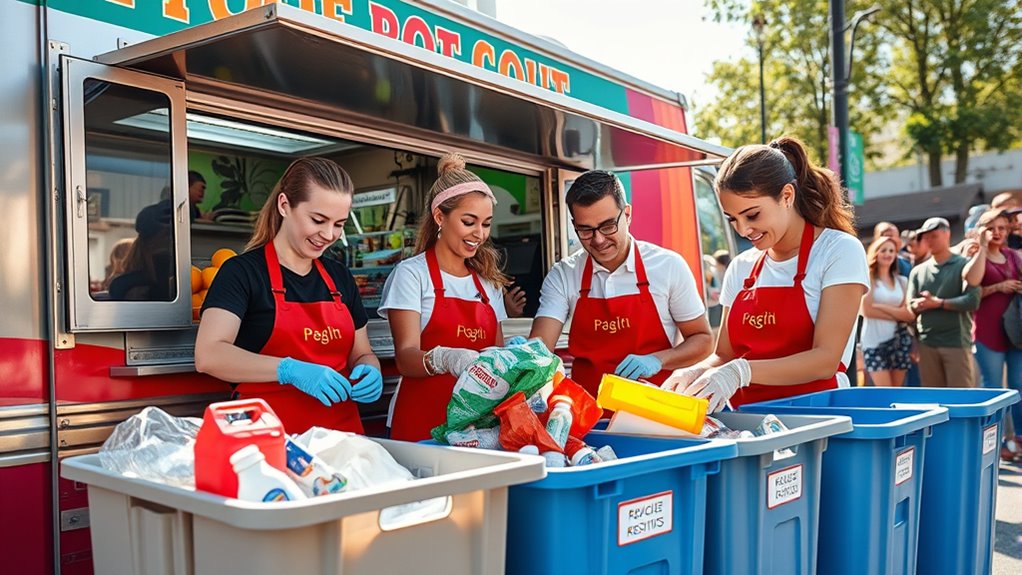
You need to guarantee your staff understands proper recycling practices through effective education. Regular training sessions help reinforce correct procedures and keep everyone up-to-date. By investing in ongoing education, you create a consistent approach to waste management at your food truck. Incorporating eco-friendly options into your training can further promote sustainable practices among your team.
Staff Recycling Education
Training staff on recycling practices is essential for the success of your food truck’s sustainability efforts. When your team understands proper recycling procedures, you foster staff accountability and reduce contamination. Use recycling incentives to motivate staff, making participation rewarding and encouraging consistent effort. Clearly communicate the importance of recycling to inspire buy-in and responsibility. Consider these key points:
- Educate staff on the types of recyclables and proper sorting methods
- Implement a system to track individual recycling contributions
- Offer rewards or recognition to reinforce recycling incentives
- Incorporate AI-powered monitoring tools to ensure compliance and improve training accuracy
- Understanding recycling technology helps staff adapt to evolving practices and improves overall efficiency.
Ongoing Training Sessions
Since recycling practices can evolve as your food truck operates, scheduling regular ongoing training sessions guarantees staff stay informed and engaged. During these sessions, emphasize recycling incentives that motivate team members to follow best practices consistently. Incorporate waste audit techniques to help staff identify areas for improvement and track progress. Regular training keeps everyone updated on any changes to recycling protocols or new materials to sort. It also reinforces the importance of proper waste separation, reducing contamination and increasing recycling efficiency. By reviewing waste audit results together, you can address issues proactively and motivate staff with recognition or incentives. These ongoing sessions ensure recycling remains a priority, fostering a culture of sustainability that benefits your truck’s operations and environmental impact.
Coordinating With Local Recycling Facilities
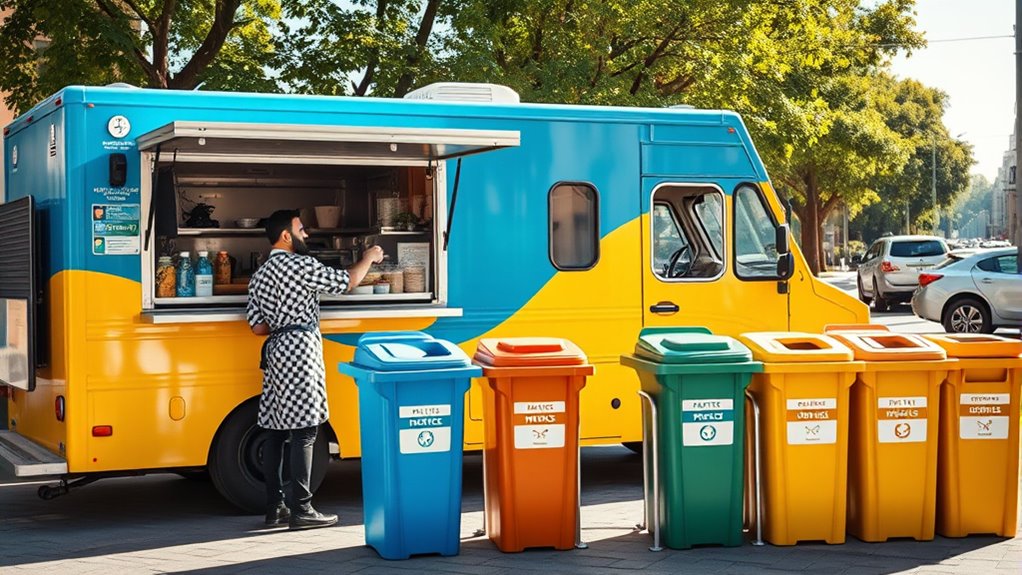
Establishing a strong partnership with local recycling facilities is essential for the success of your food truck’s recycling program. You need clear communication about recycling collection and waste pickup schedules to ensure smooth operations. Reach out to facilities to understand their requirements and available services. Collaborate to set consistent pickup times that match your truck’s schedule, avoiding overflow or missed collections. It’s also helpful to confirm accepted materials so you can properly sort waste. Building good relationships helps address any issues quickly and keeps your recycling efforts on track.
- Clarify recycling collection days and times
- Understand material acceptance guidelines
- Establish direct contact for quick problem-solving
Promoting Eco-Friendly Initiatives to Customers
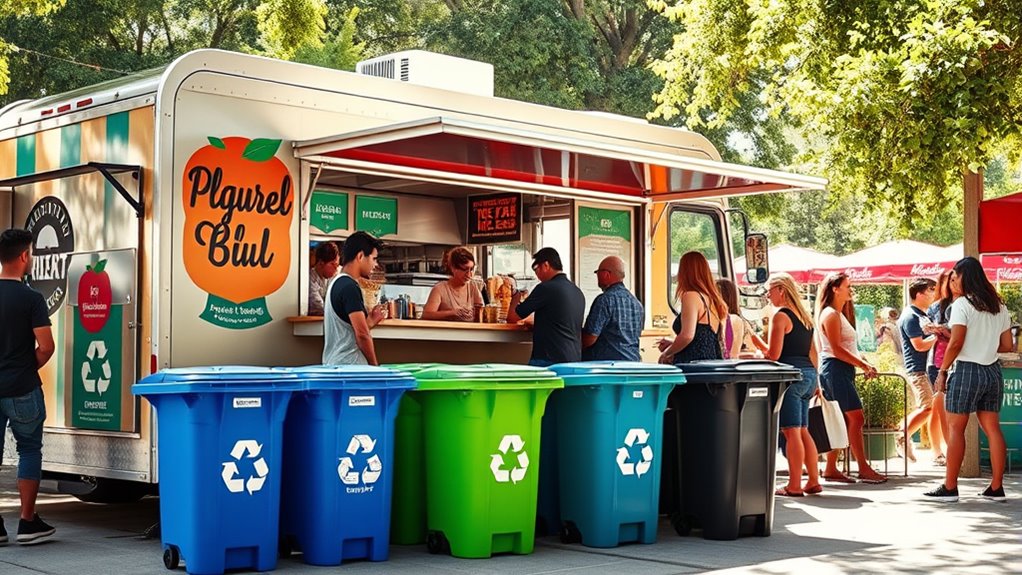
Building on your efforts to coordinate with local recycling facilities, you can amplify your impact by actively promoting eco-friendly initiatives to your customers. Highlight composting options available for food scraps and encourage them to participate. Educate customers about biodegradable packaging and how it reduces environmental harm compared to traditional materials. Use signage and social media to share your sustainability practices, making eco-conscious choices clear and accessible. Offer incentives for customers who bring reusable containers or participate in composting programs. By engaging your patrons, you foster a community committed to sustainability. This not only enhances your food truck’s reputation but also helps reduce waste and environmental impact. Clear communication and visible efforts motivate customers to join you in making eco-friendly habits part of their dining experience.
Frequently Asked Questions
How Can I Motivate Staff to Consistently Follow Recycling Protocols?
You can motivate staff to follow recycling protocols by offering employee incentives that reward consistent adherence. Regular staff training helps reinforce the importance of recycling and clarifies procedures. Recognize and celebrate those who excel, creating a positive environment. Clear communication about the environmental impact and the benefits of recycling can also boost motivation. When staff see the value and receive rewards, they’re more likely to stay committed to your recycling efforts.
Are There Cost-Effective Recycling Options Suitable for Small Food Trucks?
Think of your food truck as a tiny garden needing care. Affordable disposal options like compact bins act as your watering cans, making recycling simple and manageable. These small, space-saving bins fit easily into your truck, encouraging staff to sort waste correctly. By choosing cost-effective solutions, you nurture eco-friendly habits without breaking the bank, turning your truck into a sustainable mobile kitchen that benefits both the environment and your business.
How Do Recycling Regulations Vary Between Different Cities or States?
You should know that recycling regulations vary between different cities and states. Municipal recycling programs often set specific rules about what materials are accepted and how they must be sorted. State regulations can add further requirements or incentives. To stay compliant, you need to research local municipal recycling guidelines and state regulations, as they influence your waste management practices and guarantee you’re meeting legal standards in your area.
What Are the Best Ways to Educate Customers About Recycling Efforts?
Imagine your food truck bustling with energy, customers enthusiastic to enjoy their meals. To boost recycling efforts, you can use eye-catching recycling signage that clearly shows what goes where. Engage customers with friendly prompts and quick explanations, turning them into recycling ambassadors. Your active customer engagement, combined with visible signage, creates a seamless flow, making recycling second nature. This approach transforms a simple act into a shared responsibility, fostering a greener community.
How Can I Track the Environmental Impact of My Recycling Program?
You can track your recycling program’s impact by monitoring waste diversion rates and calculating your carbon footprint reductions. Keep detailed records of how much waste gets diverted from landfills and track changes over time. Use tools like waste audits or software that measure environmental impact. These methods help you see how effectively your efforts reduce greenhouse gases and promote sustainability, turning your recycling program into a measurable success.
Conclusion
By embracing recycling, you create a vibrant tapestry of sustainability that brightens your food truck’s reputation. With each carefully placed container and mindful practice, you weave a cleaner, greener future—like a gentle ripple spreading outward. Your commitment transforms everyday waste into a subtle bloom of eco-consciousness, inviting customers to join your journey. Together, you craft a more beautiful world, one mindful action at a time, where every effort blooms into lasting change.
